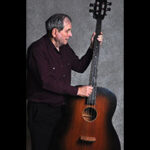There are countless things you can do to keep the groove alive
By Jon Liebman
November 25, 2022
Have you ever noticed how certain things you’ve been doing all your life have gotten harder to do?
You don’t move as fast as you used to. Your workouts, if you manage to get any in, tend to be lighter than back in the day.
On top of that, maybe you’ve got arthritis, or you’ve had surgery.
And what’s up with that metabolism? You used to eat – whatever it is you eat – all the time without putting on weight. When did your body become so unforgiving?
A lot of those things are inevitable. It’s all part of the aging process, and old rockers, alas, are not exempt.
And that includes bass players.
So, as a bass player, how are you supposed to deal with the realities of being an old rocker?
Don’t fight it; go with it
I had a fun, enjoyable conversation with Mike Watt a couple weeks ago, published as this week’ FBPO interview. Never one to hold back his thoughts, Mike had plenty to say on the subject.
“You gotta go to with where your body’s at,” Mike says. “You have to listen to your body. You’re on this journey where it’s kind of a beat-down, to be honest. You know, you get tore up,” he said, citing his own personal experience.
Undeterred, Mike has always done whatever he needed to do in order to keep playing the bass. “For example,” he says, “late ‘90s, I had to move to doing gigs with short-scale basses because my hands were just getting too sore.”
Change is good
While acknowledging that aging was making it harder for him to play the bass, Mike wasn’t going to let anything stand in his way.
“There’s ways of dealing with it,” he says. “Play less notes. Play ‘em softer. Use smaller scale (basses). Maybe lower action. All these kinds of things. But you gotta listen to your body.”
In light of these newfound difficulties, change wasn’t just an option; it was a necessity. Trying to do things the way he used to do them was all but impossible.
“Going back would probably be the worst thing I could do,” Mike says, “because my body could not handle a lot of those ways.”
Awareness is key
The first thing you need to do to solve any problem is acknowledge its existence. Only then can you make a plan of action to solve it, rather than blindly going through the motions just because you’ve “always done it this way.”
“You gotta be cognizant of that and you gotta adapt to it,” Mike says. “You gotta work with it. Sometimes I think we get locked into sleepwalking, cruise control things and we’re not thinking about what we’re doing.”
Coming to terms with the situation is crucial. “You can’t do it that way (any more),” he says. “You change. You’re down the road. You’re in another place. I think I play less notes now than I did in the older days. It’s not on purpose. Just it’s where I’m at.”
It’s not as bad as you think
A big wakeup call for a lot of people is when they discover that you don’t have to be a bass virtuoso in order to play a bass line that gets the job done and makes the music feel good. My students in the Bottom Line Club, most of whom identify as old rockers, understand this very well.
“I love the way you’re teaching people,” Mike told me. “You’re teaching them theory and musical things, harmonic things, rhythmic things, melodic things… but you’re also teaching them practical things with their body because that is an issue, especially in the less-younger moments,” he says with a laugh.
It really comes down to taking a potentially negative thing and turning it into a positive. Mike has endured his share of physical challenges over the years. So far he’s refused to let them stop him from playing bass.
“Maybe part of it’s being a cripple,” Mike says, “like right now I’m using crutches. That doesn’t mean I can’t do other things. Okay, no cartwheels. No skydiving. Other things. I can play the hell out of the bass!”
Your turn. How have the physical challenges of getting older affected your ability to play bass? What are you doing to combat those things in order to continue grooving? Leave a comment below and share your story. And be sure to watch my interview with Mike here.






I fully understand the aging process. Back in the early 90’s it became obvious that I was developing carpal tunnel syndrome, and equally obvious that my factory career and bad bass/ guitar technique we’re the culprits. There wasn’t much I could do about the factory problem, but reinventing myself technique -wise helped immeasurably. Even though the years of repetitive motion at work have taken their toll, turning to a more ergonomic way of playing bass (and guitar) has saved me as a musician. Now, at 61 my playing is strong, my groove, unwavering! I must however, give credit where credit is due. Billy Sheehan released an instructional video in the late 80’s and it provided the information I needed to reinvent myself. A heartfelt thank you goes out to Billy Sheehan!
What an inspiring story, Joe! I’m glad you found a workaround and a more ergonomic way of playing bass. Thanks so much for your comment! Please reach out to me anytime and keep my posted on your progress. And yes, Billy Sheehan’s great! Here’s a link to my most recent interview with him: https://forbassplayersonly.com/billy-sheehan-2-2/
I totally understand. I
Haven’t played in awhile because I was bored. I couldn’t relax and let go like I did years ago.
It just didn’t come naturally.
Time too give it another try !!!
Thanks for weighing in, David. I’m cheering you on, every step of the way!